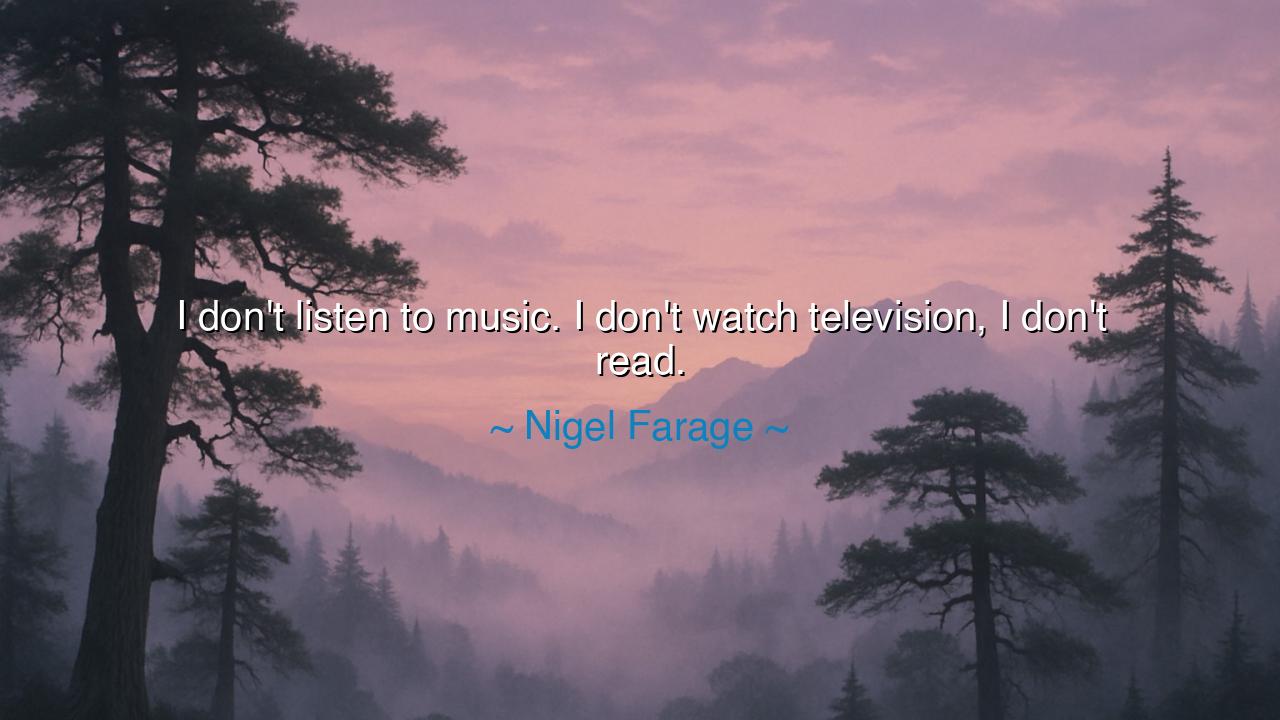
I don't listen to music. I don't watch television, I don't read.






The words of Nigel Farage—“I don’t listen to music. I don’t watch television, I don’t read.”—stand as stark and jarring in their simplicity, like a barren field where one expects to find trees and flowers. In this declaration lies not only a personal confession but also a reminder of how some choose to face the world: unshaped by art, unswayed by story, untouched by melody. Whether spoken in pride or indifference, these words reveal a philosophy that values the rawness of lived experience above the refining fire of imagination.
To the ancients, such a stance would have been both strange and sobering. For they believed that music shaped the soul, that the melodies of the lyre could tame chaos within. They knew that reading, even in the form of listening to stories told by elders, was the path to wisdom, that the mind must be nourished just as the body is fed. And they held that public spectacle—the ancient form of television—bound communities together, giving people a shared sense of who they were. To refuse these was to step apart from the common thread of culture, to live as one unmoored from the currents that carry humanity forward.
Yet Farage’s words remind us of another truth: there have always been those who reject the shaping hands of art and culture, preferring instead to carve themselves alone, without the influence of others. This is not new. The Stoic philosophers of Greece and Rome often retreated from poetry, fearing it distracted from reason. Diogenes, the Cynic, rejected books and customs, preferring to live according to what he called “nature.” Farage’s declaration echoes these rebels, who sought authenticity not in song or story but in confrontation with the world itself.
But history shows us that when leaders close themselves off from music, literature, and the shared imagination of their people, they risk becoming narrow, unable to see beyond their own horizon. Consider the example of Joseph Stalin, who distrusted poets and artists, fearing their words more than armies. In denying himself and his people the freedom of expression, he crushed the spirit of millions. By contrast, figures like Winston Churchill, who devoured books and found strength in painting, drew upon the arts to sustain their spirit in times of trial. Thus we see the double edge of Farage’s words: such detachment can forge independence, but it may also breed a dangerous poverty of the soul.
The deeper meaning of this statement may lie in its rejection of distraction. In an age drowned in noise, where television shouts endlessly and music is consumed without thought, there is wisdom in sometimes turning away. To close the eyes, to shut the ears, to step into silence—this too can be a path to clarity. Perhaps, in some sense, Farage’s words remind us that not all who abstain are empty; some seek focus, an unclouded view of the world around them. Yet the risk is great: for silence can enlighten, but it can also isolate.
The lesson for us is this: balance is needed. To cut oneself off entirely from the arts is to risk losing the wisdom, joy, and vision they bring. Yet to drown in them without reflection is to risk distraction and waste. The path of wisdom lies between these extremes: to listen when music lifts the soul, to read when words sharpen the mind, to watch and observe when vision enlarges the heart—yet to also embrace silence when the soul needs stillness.
Practically, this means cultivating a discipline of both engagement and withdrawal. Read deeply, but not endlessly. Listen to music that nourishes, not merely entertains. Use the tools of modern media with caution, choosing not what numbs but what enlightens. And yet, when needed, step away into silence, so that the voice within is not drowned by the voices without.
Thus, Farage’s stark confession becomes a mirror for us all. Will we choose emptiness, or will we find balance? Will we live untouched by the arts, or will we allow music, literature, and story to be companions on the journey? Let us take from his words not imitation, but reflection: for a life that neither reads, nor listens, nor beholds may be free of distraction, but it may also be free of depth. And to live without depth is to walk through the world like a shadow, never fully alive.






AAdministratorAdministrator
Welcome, honored guests. Please leave a comment, we will respond soon